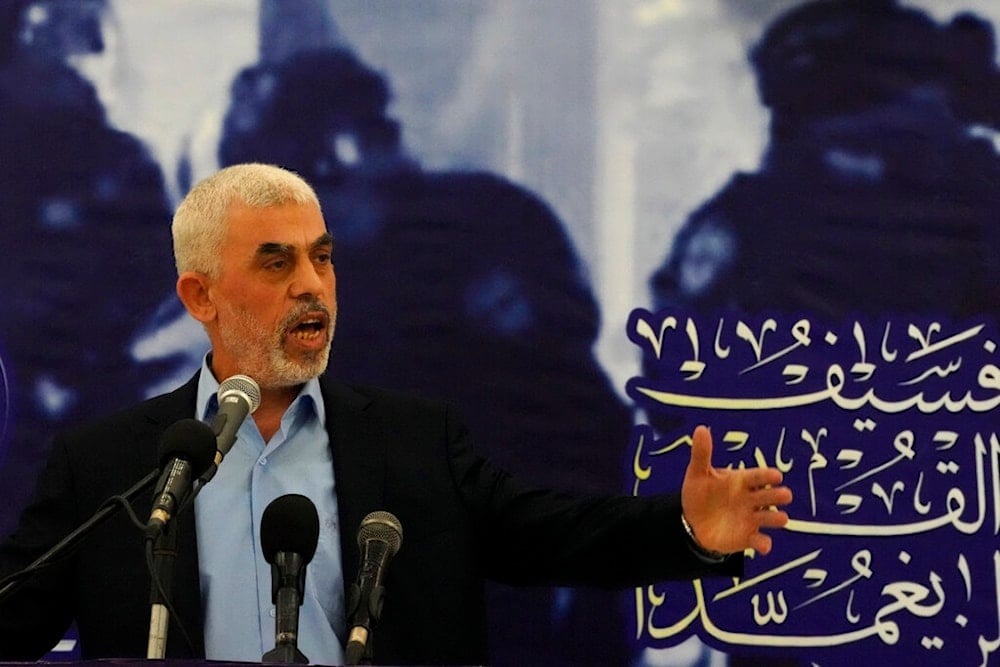The election of Yahya Sinwar contradicts Western media's perception
"Israel's" assassination of the main negotiator in the ceasefire talks and Yahya Sinwar's election to his new post were widely discussed in Western media, though many did so based on false pretenses.
-

Yahya Sinwar, head of Hamas in Gaza, delivers a speech during a meeting with people at a hall on the sea side of Gaza City, Saturday, April 30, 2022. (AP)
On Tuesday, the Hamas Resistance movement announced the political bureau's unanimous election of leader Yahya Sinwar, who will succeed Martyr Ismail Haniyeh as the leader of the group's political office.
Shortly after, Western media outlets like The New York Times, The Wall Street Journal, and The Economist, reported on the announcement in extensive pieces analyzing Hamas as Sinwar takes on his new role.
Yahya Sinwar, the mastermind behind Operation Al-Aqsa Flood, has long been perceived [by Western media and governments] as a hard-liner who would manifest a rift between Hamas, its allies, and internal leaders who "are more interested in diplomacy," as alleged by The Economist, versus a more pragmatic Ismail Haniyeh, who consistently advocated for a ceasefire before his assassination by the Israeli occupation in Tehran, Iran.
However, their perception was faulty, as a source close to Hamas revealed that the movement's election placed Sinwar on top of the structure in a unanimous vote, showing that Sinwar received the full backing of the Resistance movement's members.
Sinwar's ideology lights the path of Resistance
The unanimous election of Yahya Sinwar to be the movement's top leader propounds an affirmation that the movement rallies behind its leader's vision and strategy.
"Hamas is delivering a message that it is strategically lined up behind the armed resistance approach and sets Sinwar as an undisputed leader for the movement," Jehad Harb, a political analyst with the Palestinian Center for Policy and Survey Research, a West Bank-based think tank, told WSJ.
It further confirms that Sinwar's ascension into the top leadership position within the movement displays its quest for liberation, regardless of the cost. Hamas launched Operation Al-Aqsa Flood and ignited the first steps for the liberation of the entirety of Palestine, rather than just maintaining political governance of the Gaza Strip.
It did so with the absolute recognition of the human losses it would witness at the hands of the Israeli occupation.
According to Western media outlets, the assassinations of its political leaders have not deterred the Resistance movement or its end goal. On the contrary, "Israel's" long history and strategy of assassinating the Palestinian Resistance's revolutionary symbols would only further invigorate the latter's thirst for liberation.
The fate of negotiations
The Economist claimed Sinwar's election would impede negotiations and any chance of a ceasefire deal in Gaza, reiterating US Secretary of State Antony Blinken's allegations of Yahya Sinwar being the "primary decider when it comes to concluding the ceasefire."
The Wall Street Journal focused on the false notion that the movement's decision-making has been solely focused on Sinwar's choices.
Meanwhile, The New York Times cited a former Israeli intelligence officer declaring Yahya Sinwar as the focal point of decisions made by Hamas.
However, Hamas' final decisions do not rest on the newly elected political bureau chief's choices. Yahya Sinwar has always been a high-ranking Hamas leader, which entails influence regarding decisions, contrary to the consistently pushed narrative of him being a hardliner seeking to prolong the Israeli war on Gaza in the face of an "Israel" that is allegedly committed to reaching a ceasefire and prisoner exchange agreement.
Martyr Ismail Haniyeh had been at the forefront of mediated negotiations since October and recurrently recalled the Israeli occupation's insolence and indifference to achieving a ceasefire deal. Even when a temporary ceasefire was established in Gaza in November, "Israel" violated its covenant.
Qatari and Egyptian mediators also frequently highlighted the Israeli obstruction of indirect talks and extensively discussed how the occupation would double back from already-agreed-on demands or introduce new demands that contradict previously established ones, a strategy dubbed as a means to delay or put off negotiations as a whole.
Then, the Israeli occupation assassinated the main negotiator [Ismail Haniyeh] while he was visiting Tehran for the swearing-in ceremony of its newly elected president, thus showing that the ceasefire talks were not their primary concern.
Read more: Who is Yahya al-Sinwar, the artist behind Operation Al-Aqsa Flood?

 4 Min Read
4 Min Read









